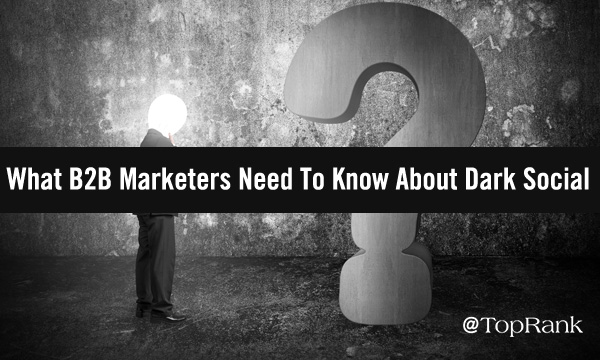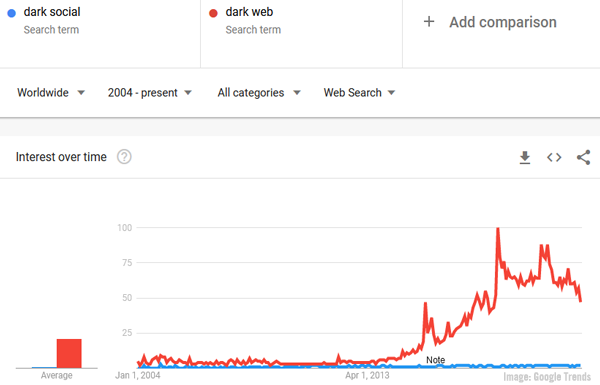
 What do B2B marketers need to know about so-called dark social, and what are the best ways to manage and integrate unattributable site visitor traffic? Is the old adage that any traffic is good traffic still true as we knock on 2022’s digital marketing door? As we fall back for daylight saving time, let’s spring forward and take a look at these questions and more.
What do B2B marketers need to know about so-called dark social, and what are the best ways to manage and integrate unattributable site visitor traffic? Is the old adage that any traffic is good traffic still true as we knock on 2022’s digital marketing door? As we fall back for daylight saving time, let’s spring forward and take a look at these questions and more.
What Is Unattributable Traffic — a.k.a. Dark Social?
Historically, both dark social and the dark web have had somewhat muddled definitions, as each term has been used to mean both the unattributable segments of the online landscape and — quite differently — the unsavory portions of our Internet realm. For our purposes, we’ll examine dark social as it relates to the difficulties most marketers face when it comes to trying to measure visitor traffic from largely unknown sources. In our usage case, dark social simply refers to the way people share links to our content using private social channels, such as secure messaging apps — whether they originate from WhatsApp and its two billion global users, iMessage, Facebook Messenger, Signal, Slack, or the vast array of other alternatives.Dark Social Isn’t New
First let’s take a look at how the popularity of the terms “dark social” and “dark web” have changed over time and in our digital lexicons. Clearly dark social hasn’t seen nearly the usage that the dark web has, yet dark social has endured as an ongoing puzzle for marketers and search engine optimization professionals alike. The use of private messaging communication has increased worldwide, which means that more people are sharing links that don’t come from the traditionally measurable online public sources such as the major social media platforms, search engines, webmail, and easily-measured plain old web links. While dark social isn’t new, the measurement challenges it presents may be growing in scope, however, as marketers are facing a new black hole where attribution data was once available, in the form of disappearing web browser cookie data and an increase in the number of folks using ad-blocking technology.
Clearly dark social hasn’t seen nearly the usage that the dark web has, yet dark social has endured as an ongoing puzzle for marketers and search engine optimization professionals alike. The use of private messaging communication has increased worldwide, which means that more people are sharing links that don’t come from the traditionally measurable online public sources such as the major social media platforms, search engines, webmail, and easily-measured plain old web links. While dark social isn’t new, the measurement challenges it presents may be growing in scope, however, as marketers are facing a new black hole where attribution data was once available, in the form of disappearing web browser cookie data and an increase in the number of folks using ad-blocking technology.
Disappearing Cookie Data & Increasing Ad-Blocking Form A New Measurement Black Hole
via GIPHY Between 1994 and 1996, as the web grew, so did the implementation of cookies — the bits of data used to keep track of who’s visited a particular website before — and as marketers we’ve seen their use explode over the intervening years, leading to the data privacy concerns and regulations that have grown over the past several years. As the maker of the web’s most popular browser Chrome, Google’s decision this year to phase out its use of third-party cookies — those that go beyond simply tracking visitors on a single site — has undoubtedly caused substantial consternation among marketers. While Google pushed back its timeline for implementing the third-party cookie cutoff until the later part of 2022, marketers are exceedingly likely to eventually face a new day when it will no longer be possible to track site-to-site browsing history — at least for users of Chrome — and focus will out of necessity need to shift to new ways of using first-party cookies, along with Google’s forthcoming Federated Learning of Cohorts (FLoC) alternative. One marketing industry professional recently urged those looking to gauge the impact of what they’re doing with consumer data in cookies by taking the time to ask themselves, “Would I do this with my own mother’s data?” — always a good question to ask when it comes to how we treat others, including their browsing data.Is Any Traffic Good Traffic?
With so much existing unattributable traffic and some cookie tracking options on the way out, just where should marketers focus their efforts when it comes to measurement? As Sir Arthur Conan Doyle wrote for his famous sleuth Sherlock Holmes, “When you have eliminated the impossible, whatever remains, however improbable, must be the truth,” and for B2B marketers dealing with dark social and significantly diminishing cookie tracking options, taking a similar approach could very well be a wise choice. In 2022 savvy marketers will meet these challenges head on and turn them into new opportunities by increasing their focus on the traffic sources that can be measured, and by paying greater attention to first-party cookie data. Surprisingly, dark social and the loss of third-party cookie data may be blessings in disguise, as marketers will increasingly have to get more out of the information they do have at their control. Then, as Sherlock suggested, the data black hole that remains — can also be more accurately measured against the known, making obscured traffic origins clearer by the brute force of eliminating the alternatives. Although hidden dark social traffic may never be thoroughly unveiled, unless fundamental tracking changes are made to the underpinnings of deeply entrenched Internet protocols — marketers may face a future with less user data than ever, especially as concern for data privacy increases globally.What’s Old Is New Again — Server Log Analysis & The Power Of Trust
As B2B marketing teams look to do more with the data they already have access to, the rather old-fashioned and unglamorous practice of server log-file analysis may see an uptick in 2022 and beyond. A website’s server log files can contain a wealth of helpful information, potentially showing every search people conducted while on your site, along with tracking their navigation journey through a site. Getting access to this information depends on your organization and whether you host your own site. It’s important to know as much as possible about where your traffic is coming from, however with the rise of dark social and the eventual loss of the majority of traditional third-party cookie tracking data, smart marketers don’t want to overlook any information sources when it comes to finding out more about their audience and what they want. Dark social may hide the origin of your visitors, however the fact that you've got traffic arriving even in obscured form shouldn't be overlooked, and may point to an especially powerful type of content sharing. "Word-of-mouth remains one of the most effective and natural marketing drivers," Sanjay Sarathy, vice president of marketing at SaaS technology firm Cloudinary, recently noted. "The person who shares a link to a loved one has already qualified that potential lead, and in doing so has become a champion of your brand. People trust people more than they trust brands," Sarathy added. This type of trust reinforces the power of influence, especially in the B2B marketing landscape, as our CEO Lee Odden has explored in, "Inside B2B Influence: Sarita Rao of AT&T on Growing B2B Executive Influence with Social Media," and "Inside B2B Influence: Brian Solis of Salesforce on the Future of Influence in B2B Marketing." [bctt tweet="“Word-of-mouth remains one of the most effective and natural marketing drivers. The person who shares a link to a loved one has already qualified that potential lead, and in doing so has become a champion of your brand.” — Sanjay Sarathy" username="toprank"]Turn Your Marketing’s Dark Social Black Hole Into Northern Lights
via GIPHY By keeping the concerns we’ve examined in mind, we hope that you’ll be better equipped to face the traffic attribution and data analysis changes coming down the pike in 2022, and turn the dilemmas of dark social into something more like a digital version of the curious spectacle of northern lights. Next year it will be even more important to stay on top of the latest news on dark social, data privacy, and other vital marketing topics. B2B marketing industry news sources, such as our long-running weekly TopRank Marketing digital marketing news each Friday, can help marketers stay abreast of key shifts and how they affect our industry. No matter how well you’re able to track it, crafting award-winning B2B marketing takes considerable time and effort, which is why an increasing number of firms are choosing to work with a top digital marketing agency such as TopRank Marketing. Reach out to us today to learn how we can help, as we’ve done for over 20 years for businesses ranging from LinkedIn, Dell and 3M to Adobe, Oracle, monday.com and others.The post Traffic’s Black Hole: What B2B Marketers Need To Know About Dark Social appeared first on B2B Marketing Blog - TopRank®.
from B2B Marketing Blog – TopRank® https://ift.tt/3c0m1Kp
via IFTTT
No comments:
Post a Comment